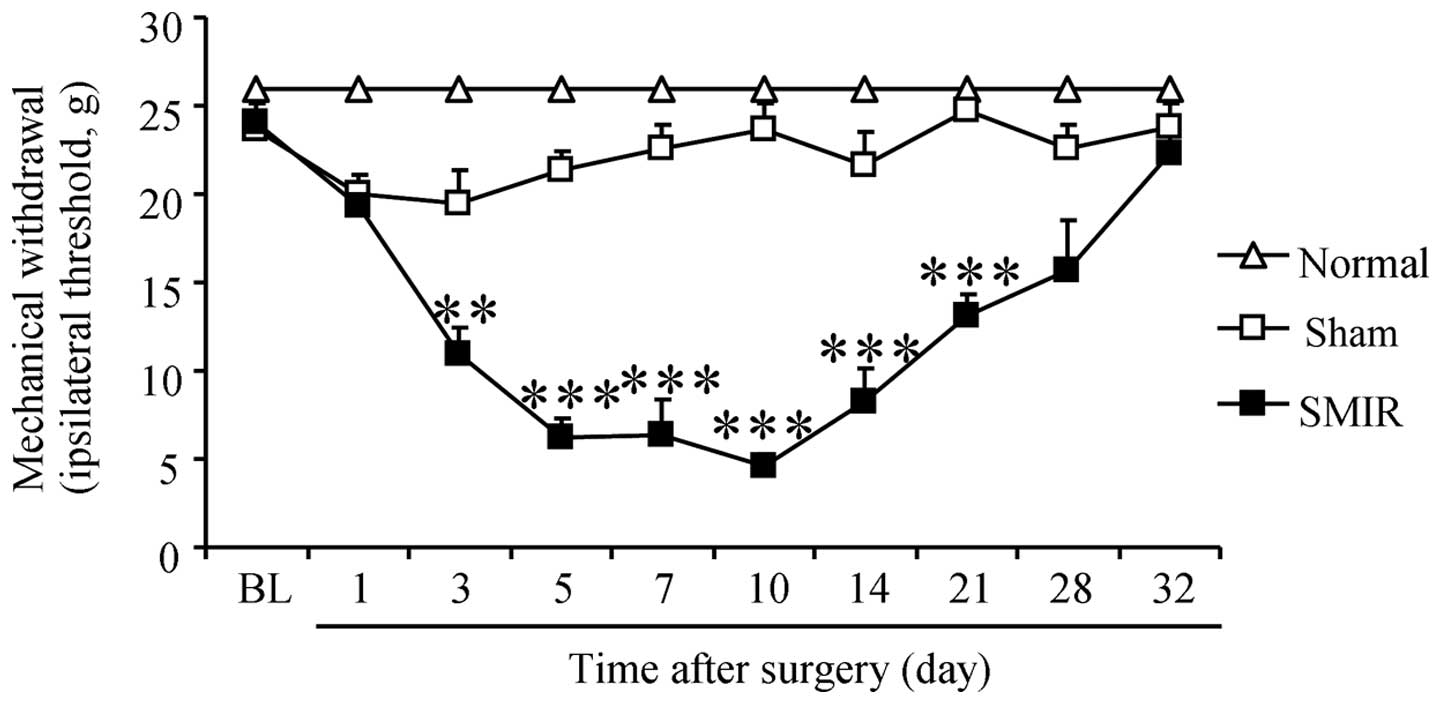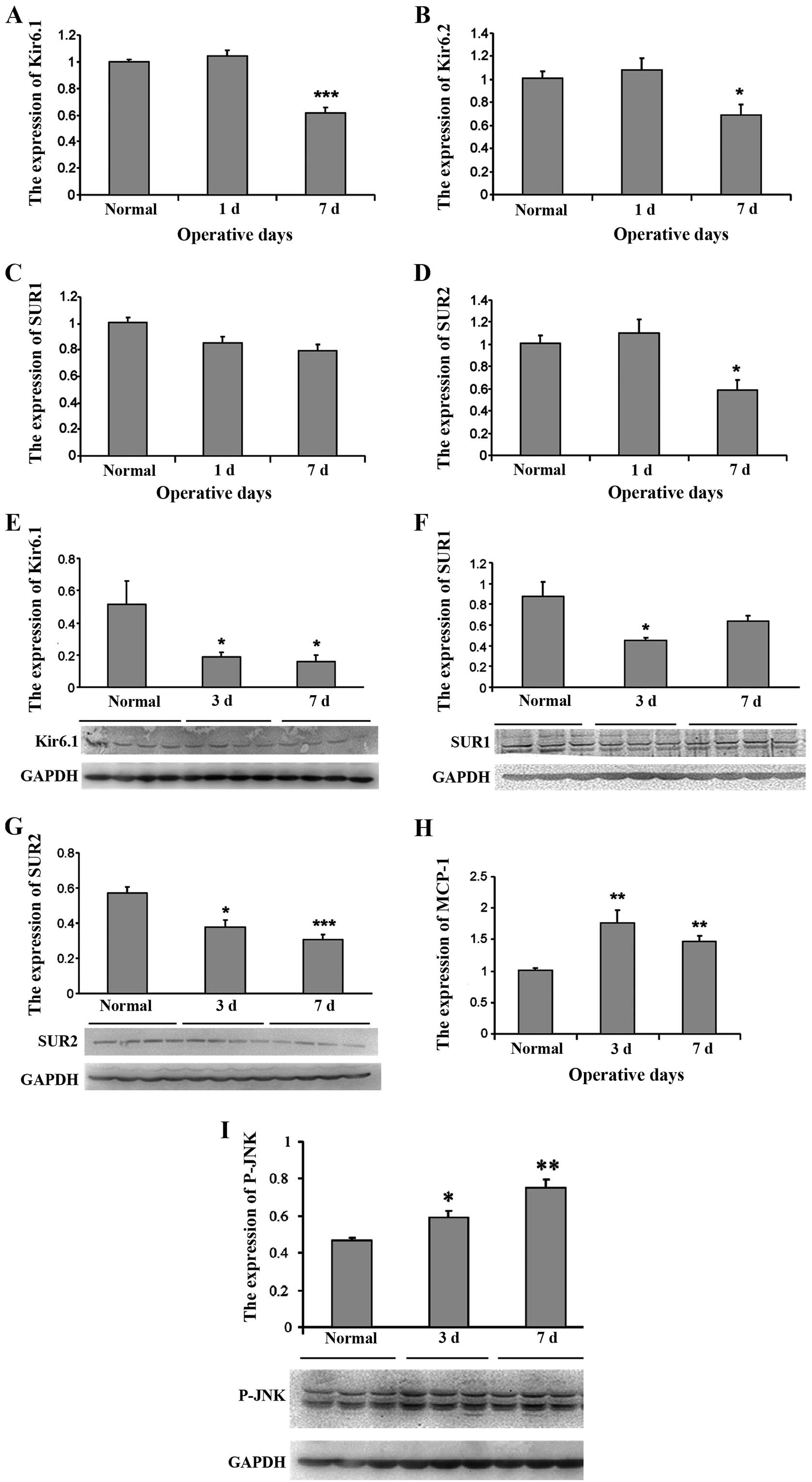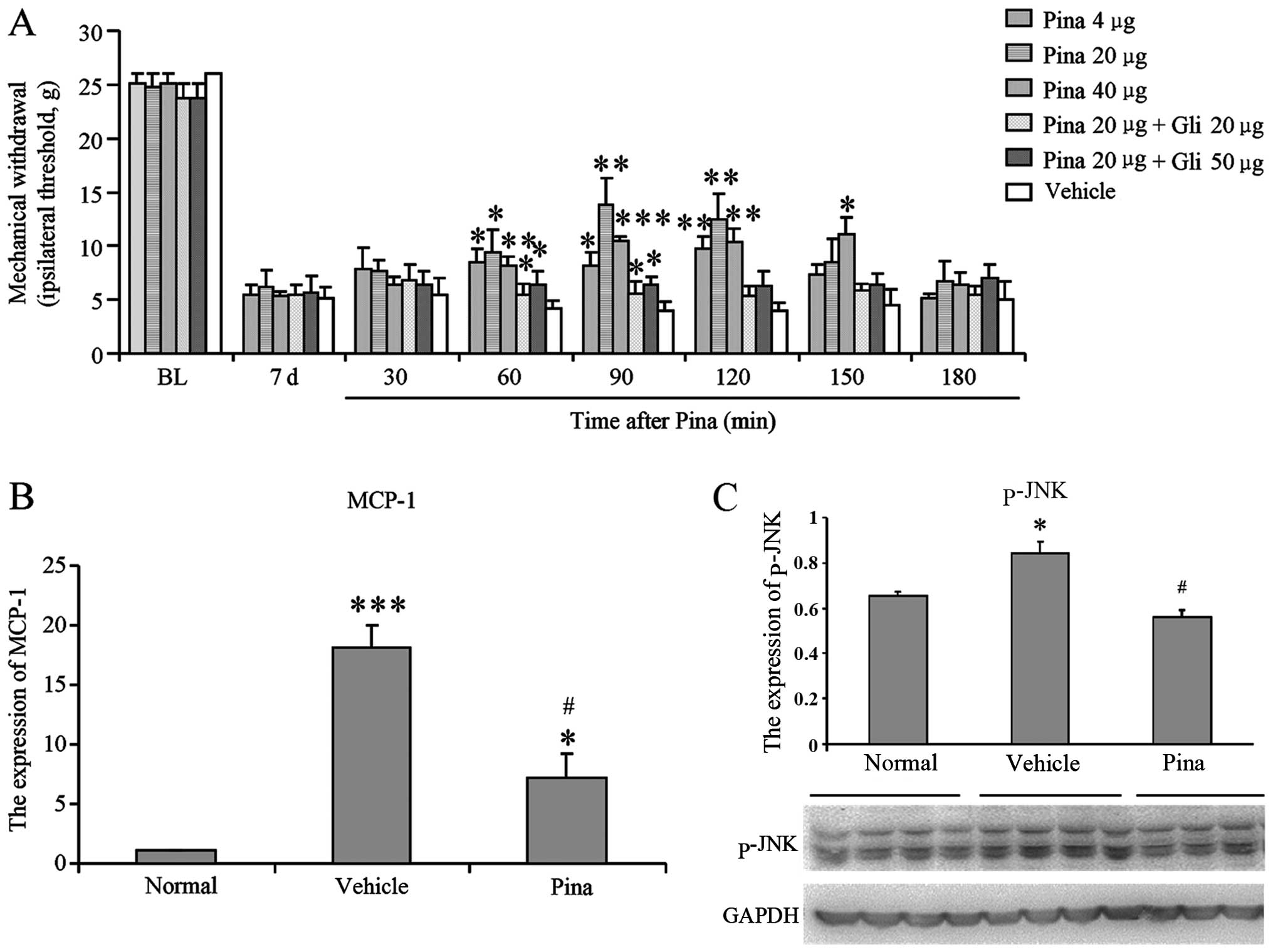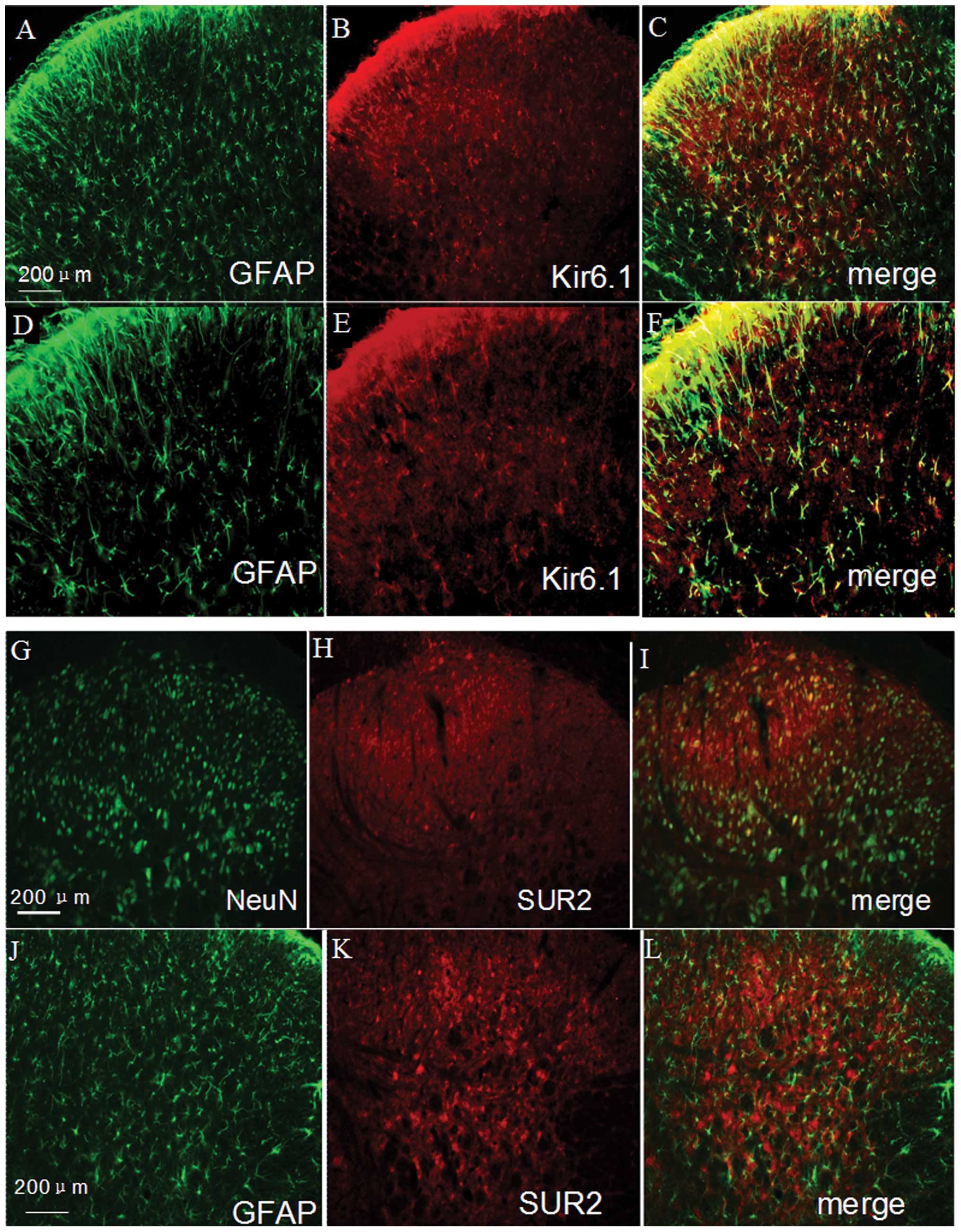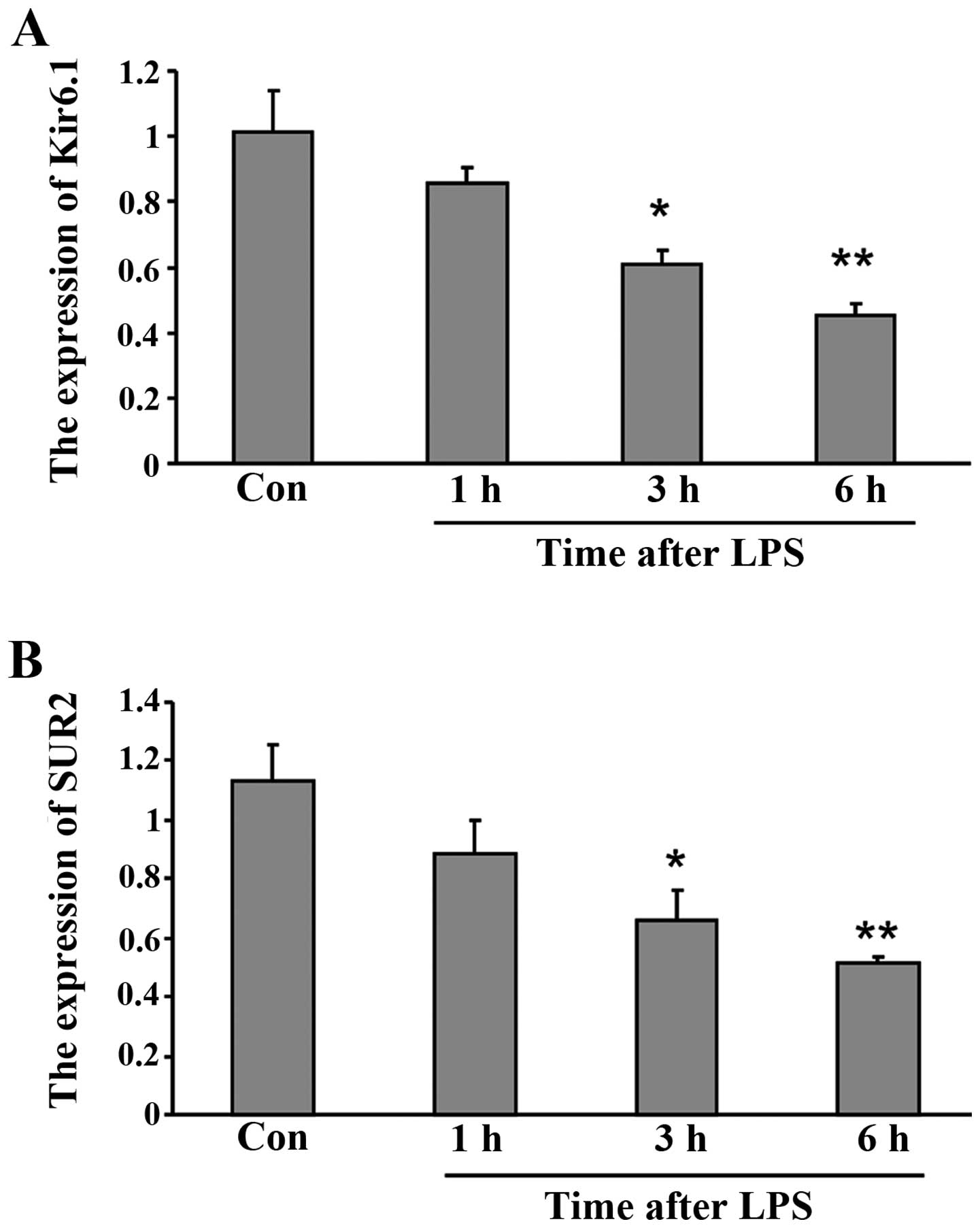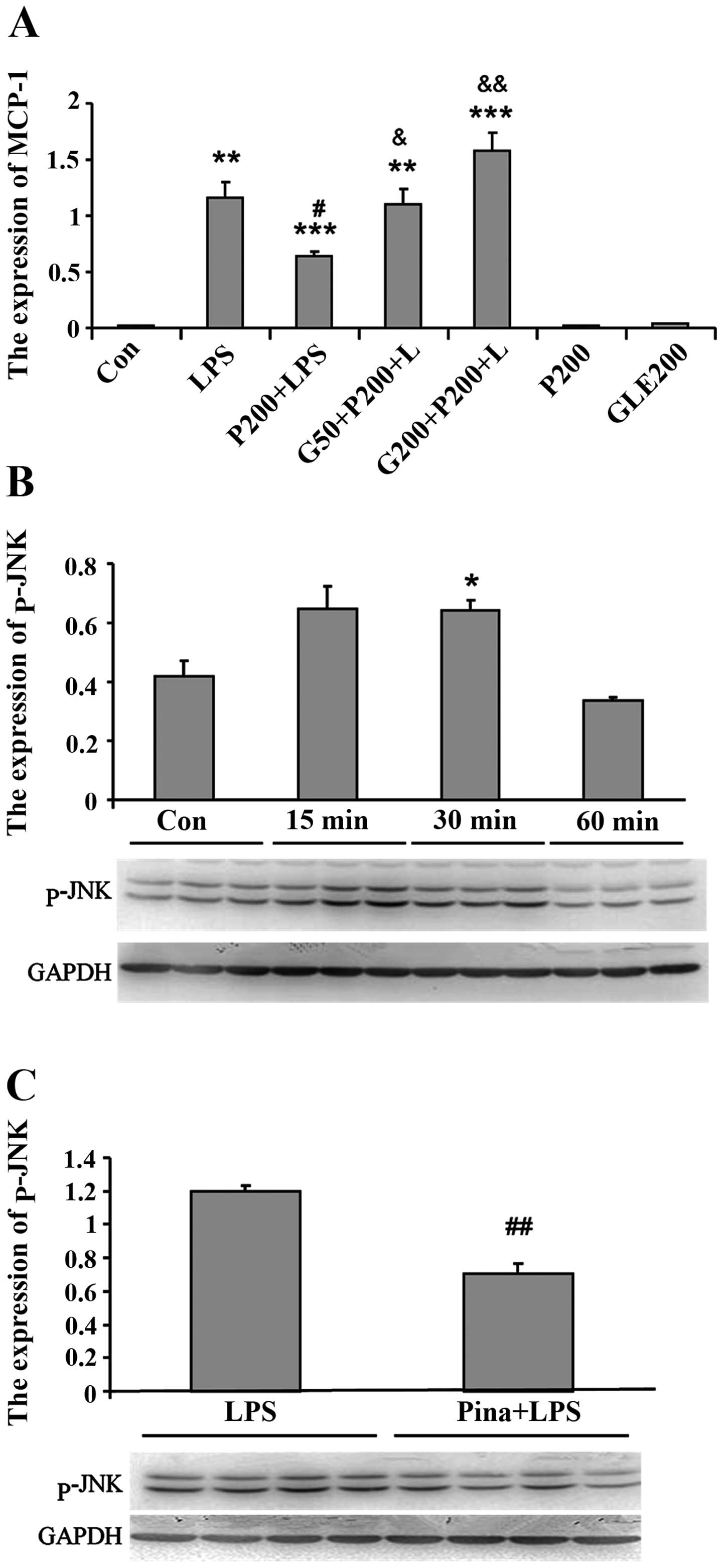|
1
|
Deumens R, Steyaert A, Forget P, et al:
Prevention of chronic postoperative pain: cellular, molecular, and
clinical insights for mechanism-based treatment approaches.
Progress Neurobiol. 104:1–37. 2013. View Article : Google Scholar
|
|
2
|
Kehlet H, Jensen TS and Woolf CJ:
Persistent postsurgical pain: risk factors and prevention. Lancet.
367:1618–1625. 2006. View Article : Google Scholar : PubMed/NCBI
|
|
3
|
Caffo O, Amichetti M, Ferro A, Lucenti A,
Valduga F and Galligioni E: Pain and quality of life after surgery
for breast cancer. Breast Cancer Res Treat. 80:39–48. 2003.
View Article : Google Scholar : PubMed/NCBI
|
|
4
|
Zoga V, Kawano T, Liang MY, et al: KATP
channel subunits in rat dorsal root ganglia: alterations by painful
axotomy. Mol Pain. 6:62010. View Article : Google Scholar : PubMed/NCBI
|
|
5
|
Wu XF, Liu WT, Liu YP, Huang ZJ, Zhang YK
and Song XJ: Reopening of ATP-sensitive potassium channels reduces
neuropathic pain and regulates astroglial gap junctions in the rat
spinal cord. Pain. 152:2605–2615. 2011. View Article : Google Scholar : PubMed/NCBI
|
|
6
|
Xia H, Zhang D, Yang S, et al: Role of
ATP-sensitive potassium channels in modulating nociception in rat
model of bone cancer pain. Brain Res. 1554:29–35. 2014. View Article : Google Scholar : PubMed/NCBI
|
|
7
|
Flatters SJ: Characterization of a model
of persistent postoperative pain evoked by skin/muscle incision and
retraction (SMIR). Pain. 135:119–130. 2008. View Article : Google Scholar
|
|
8
|
Zhang ZJ, Dong YL, Lu Y, Cao S, Zhao ZQ
and Gao YJ: Chemokine CCL2 and its receptor CCR2 in the medullary
dorsal horn are involved in trigeminal neuropathic pain. J
Neuroinflammation. 9:1362012. View Article : Google Scholar : PubMed/NCBI
|
|
9
|
Guo W, Wang H, Zou S, Dubner R and Ren K:
Chemokine signaling involving chemokine (CC motif) ligand 2 plays a
role in descending pain facilitation. Neurosci Bull. 28:193–207.
2012. View Article : Google Scholar : PubMed/NCBI
|
|
10
|
Covino B, Dubner R, Gybels J, et al:
Ethical standards for investigations of experimental pain in
animals. Pain. 9:141–143. 1980. View Article : Google Scholar
|
|
11
|
Hylden JL and Wilcox GL: Intrathecal
morphine in mice: a new technique. Eur J Pharmacol. 67:313–316.
1980. View Article : Google Scholar : PubMed/NCBI
|
|
12
|
Dixon WJ: Staircase bioassay: the
up-and-down method. Neurosci Biobehav Rev. 15:47–50. 1991.
View Article : Google Scholar : PubMed/NCBI
|
|
13
|
Scholz J and Yaksh TL: Preclinical
research on persistent post-surgical pain: what we don’t know, but
should start studying. Anesthesiology. 112:511–513. 2010.
View Article : Google Scholar : PubMed/NCBI
|
|
14
|
Gao YJ, Zhang L, Samad OA, et al:
JNK-induced MCP-1 production in spinal cord astrocytes contributes
to central sensitization and neuropathic pain. J Neurosci.
29:4096–4108. 2009. View Article : Google Scholar : PubMed/NCBI
|
|
15
|
Tarassishin L, Suh HS and Lee SC: LPS and
IL-1 differentially activate mouse and human astrocytes: Role of
CD14. Glia. 62:999–1013. 2014. View Article : Google Scholar : PubMed/NCBI
|
|
16
|
Nomura J, Busso N, Ives A, et al:
Febuxostat, an inhibitor of xanthine oxidase, suppresses
lipopolysaccharide-induced MCP-1 production via MAPK
phosphatase-1-mediated inactivation of JNK. PloS One. 8:e755272013.
View Article : Google Scholar : PubMed/NCBI
|
|
17
|
Julius D and Basbaum AI: Molecular
mechanisms of nociception. Nature. 413:203–210. 2001. View Article : Google Scholar : PubMed/NCBI
|
|
18
|
Woolf CJ and Ma Q: Nociceptors - noxious
stimulus detectors. Neuron. 55:353–364. 2007. View Article : Google Scholar : PubMed/NCBI
|
|
19
|
Liu B, Linley JE, Du X, et al: The acute
nociceptive signals induced by bradykinin in rat sensory neurons
are mediated by inhibition of M-type K+ channels and
activation of Ca2+-activated Cl− channels. J
Clin Invest. 120:1240–1252. 2010. View
Article : Google Scholar : PubMed/NCBI
|
|
20
|
Ocaña M, Cendán CM, Cobos EJ, Entrena JM
and Baeyens JM: Potassium channels and pain: present realities and
future opportunities. Eur J Pharmacol. 500:203–219. 2004.
View Article : Google Scholar : PubMed/NCBI
|
|
21
|
Delmas P and Brown DA: Pathways modulating
neural KCNQ/M (Kv7) potassium channels. Nat Rev Neurosci.
6:850–862. 2005. View
Article : Google Scholar : PubMed/NCBI
|
|
22
|
Liss B and Roeper J: Molecular physiology
of neuronal K-ATP channels (Review). Mol Membr Biol. 18:117–127.
2001. View Article : Google Scholar : PubMed/NCBI
|
|
23
|
Inagaki N, Gonoi T, Clement JP IV, et al:
Reconstitution of IKATP: an inward rectifier subunit plus the
sulfonylurea receptor. Science. 270:1166–1170. 1995. View Article : Google Scholar : PubMed/NCBI
|
|
24
|
Inagaki N, Gonoi T, Clement JP, et al: A
family of sulfonylurea receptors determines the pharmacological
properties of ATP-sensitive K+ channels. Neuron.
16:1011–1017. 1996. View Article : Google Scholar : PubMed/NCBI
|
|
25
|
Kawano T, Zoga V, McCallum J, et al:
ATP-sensitive potassium currents in rat primary afferent neurons:
biophysical, pharmacological properties, and alterations by painful
nerve injury. Neuroscience. 162:431–443. 2009. View Article : Google Scholar : PubMed/NCBI
|
|
26
|
Rodriguez AJ, Shenoy SM, Singer RH and
Condeelis J: Visualization of mRNA translation in living cells. J
Cell Biol. 175:67–76. 2006. View Article : Google Scholar : PubMed/NCBI
|
|
27
|
Vit JP, Jasmin L, Bhargava A and Ohara PT:
Satellite glial cells in the trigeminal ganglion as a determinant
of orofacial neuropathic pain. Neuron Glia Biol. 2:247–257. 2006.
View Article : Google Scholar
|
|
28
|
Du X, Wang C and Zhang H: Activation of
ATP-sensitive potassium channels antagonize nociceptive behavior
and hyperexcitability of DRG neurons from rats. Mol Pain. 7:352011.
View Article : Google Scholar : PubMed/NCBI
|
|
29
|
Obata H, Eisenach JC, Hussain H, Bynum T
and Vincler M: Spinal glial activation contributes to postoperative
mechanical hypersensitivity in the rat. J Pain. 7:816–822. 2006.
View Article : Google Scholar : PubMed/NCBI
|
|
30
|
Ledeboer A, Sloane EM, Milligan ED, et al:
Minocycline attenuates mechanical allodynia and proinflammatory
cytokine expression in rat models of pain facilitation. Pain.
115:71–83. 2005. View Article : Google Scholar : PubMed/NCBI
|
|
31
|
Svensson CI, Fitzsimmons B, Azizi S,
Powell HC, Hua XY and Yaksh TL: Spinal p38β isoform mediates tissue
injury-induced hyperalgesia and spinal sensitization. J Neurochem.
92:1508–1520. 2005. View Article : Google Scholar : PubMed/NCBI
|
|
32
|
Gao YJ and Ji RR: Targeting astrocyte
signaling for chronic pain. Neurotherapeutics. 7:482–493. 2010.
View Article : Google Scholar : PubMed/NCBI
|
|
33
|
Gao YJ and Ji RR: Chemokines,
neuronal-glial interactions, and central processing of neuropathic
pain. Pharmacol Ther. 126:56–68. 2010. View Article : Google Scholar : PubMed/NCBI
|
|
34
|
Scholz J and Woolf CJ: The neuropathic
pain triad: neurons, immune cells and glia. Nat neurosci.
10:1361–1368. 2007. View
Article : Google Scholar : PubMed/NCBI
|
|
35
|
Rossi DJ, Brady JD and Mohr C: Astrocyte
metabolism and signaling during brain ischemia. Nat Neurosci.
10:1377–1386. 2007. View
Article : Google Scholar : PubMed/NCBI
|
|
36
|
Peters CM and Eisenach JC: Contribution of
the chemokine (C-C motif) ligand 2 (CCL2) to mechanical
hypersensitivity after surgical incision in rats. Anesthesiology.
112:1250–1258. 2010. View Article : Google Scholar : PubMed/NCBI
|
|
37
|
Figura M, Chilton L, Liacini A, et al:
Blockade of K(ATP) channels reduces endothelial hyperpolarization
and leukocyte recruitment upon reperfusion after hypoxia. Am J
Transplant. 9:687–696. 2009. View Article : Google Scholar : PubMed/NCBI
|
|
38
|
Zhou F, Yao HH, Wu JY, Ding JH, Sun T and
Hu G: Opening of microglial K(ATP) channels inhibits
rotenone-induced neuroinflammation. J Cell Mol Med. 12:1559–1570.
2008. View Article : Google Scholar : PubMed/NCBI
|















